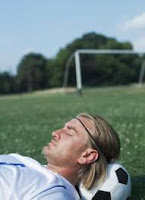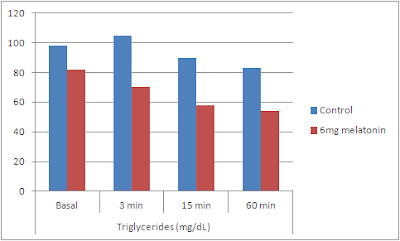 |
| Image 1: Other than you may have expected, this is exactly not what happened when the soccer players took 6mg of melatonin before their workouts. |
Melatonin makes you sleepy? I don't think so!
I guess, even after last week's news, most of you will still think of melatonin as the "sleep hormone". At least those of you who follow my recommendation to make sure that they get their daily dose of SuppVersity news should yet already be familiar with the notion that melatonin may also be a very effective ergogenic aid / adaptogen to be taken not at night, but right before an event! Contrary to the Ococha study, which, due to its awkward "loading protocol" and the ultra-endurance setting, had little relevance for the average trainee, the recently published study by M.D. Maldanado and his (or her) colleagues (Maldando. 2011) from the Department of Medical Biochemistry and Molecular Biology at the University of Seville Medical School and the Andalusian Centre of Sports Medicine in Spain is approaching an area of physical activity that is much more dear to my heart: Football! Or as you, my American friends would say, "soccer" ;-)
Note: The scientists make a very useful comment with regards to the timing of exogenous melatonin, I guess you will be interested in: "Melatonin itself has a very short half-life in the blood (range of 20–40 min, depending on condition), so that elevated levels cannot persist after many hours. According with concentration-time curve of our laboratory and other researchers, 30-45 min is [sic!] the necessary time so that oral melatonin is absorbed in the gastrointestinal tract (GIT) and can be detected in blood before its metabolism and elimination. On the other hand, considering that melatonin is not toxic and has no undesirable effects, the 6 mg administered assured us their absorption by the mucous and is within the ranges recom- mended for use in humans (3–20 mg)." I hope that will spare me at least a few of the question some of you are probably already harboring ;-)
To study the effects of pre-workout melatonin supplementation on markers of oxidative damage, the Spanish scientists recruited sixteen 18 to 20 year old professional soccer players, and randomized them to receive either placebo or 6mg of melatonin 30 minutes prior to an intense (HR >135bpm; speed 25km/h) 60-min training session on stationary bikes. |
| Figure 1: Plasma total antioxidant activity (TAS) and lipid oxidation (MDA) before, during and right after 60min of high intensity (heart rate >135bpm) exercise on stationary bike (data adapted from Maldando. 2011) |
 |
| Figure 2: Plasma triglyceride before, during and after 60min HIT training (data adapted from Maldando. 2011) |
Melatonin increases immune response to 60-min HIT exercise
Its antioxidant and fat-burning activity aside, the 6mg of melatonin eight of the sixteen soccer players consumed before they hopped onto their stationary bikes exerted a statistically significant modulatory effect on plasma IgA levels (ca. +40% after 60min), about which Maldano et al. state that it
[...] indicates the start of a humoral immune response, for which it takes between 5 and 7 days [...so that melatonin] could act to promote the adaptation between plasma and mucosal IgA during the exercise.Overall, I am becoming more and more convinced that my statement from last week that "melatonin is probably one of the most underrated supplements you can still buy without a script" is actually pretty accurate and that melatonin, as Maldono et al. put it, "could be a plausible therapeutic option for professional athletes that should make major exercises throughout their working lives" ;-)